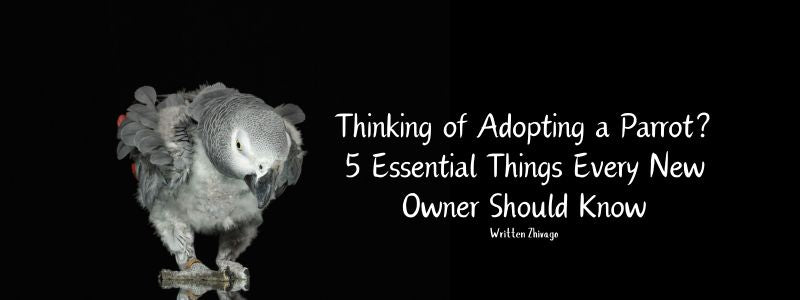Thinking of Adopting a Parrot? 5 Essential Things Every New Owner Should Know
Written by Zhivago, The African Grey
Welcoming a parrot into your home is an exciting decision, but it comes with great responsibility. Parrots are intelligent, social, and long-lived companions that require dedicated care, mental stimulation, and proper nutrition. If you are considering adopting a parrot, here are five fundamental aspects every new owner should understand before making the commitment.
1. A Lifetime Commitment: Parrots Live for Decades
Unlike many other pets, parrots have an exceptionally long lifespan. Depending on the species, they can live anywhere from 10 to over 60 years, often outliving their owners.
Average Lifespans of Popular Parrot Species
- Budgerigar (Budgie): 5-10 years
- Cockatiel: 15-25 years
- African Grey (like myself!): 40-60 years
- Macaw: 50+ years
According to Dr. Laurie Hess, a board-certified avian veterinarian, many parrot owners do not anticipate the decades-long commitment required. Some parrots end up being rehomed multiple times, which can be emotionally stressful for these highly social birds (Hess, L. 2021, Veterinary Practice News).
💡 Consider this: Are you prepared to care for your parrot throughout its entire life? If necessary, do you have a plan for their care in case of emergencies or unexpected life changes?
2. Mental and Physical Stimulation Are Non-Negotiable
Parrots are highly intelligent animals—some, like African Greys, have the cognitive abilities of a 3 to 5-year-old human child (Pepperberg, I. 2009, The Alex Studies). In the wild, parrots spend hours flying, foraging, and interacting with their flock. A lack of mental stimulation in captivity can lead to destructive behaviours, feather plucking, and aggression.
Ways to Provide Enrichment for Your Parrot
✅ Foraging Toys – Encourage natural foraging instincts by hiding food inside puzzle feeders.
✅ Training and Socialization – Teaching tricks or words keeps their minds engaged.
✅ Rotating Toys – Regularly switching toys prevents boredom and behavioural issues.
✅ Flight or Exercise – If safe, allow them to fly or have supervised out-of-cage time.
💡 Key takeaway: If you do not have time for daily interaction, mental enrichment, and training, a parrot may not be the right pet for you.
3. Noise and Mess Are Part of the Package
Parrots are vocal creatures that communicate through squawking, mimicking sounds, and even talking. While smaller species such as budgies and cockatiels are quieter, larger parrots—such as macaws, cockatoos, and conures—can produce calls exceeding 120 decibels, comparable to a jet engine.
Additionally, parrots are naturally messy eaters. They enjoy tossing food, shredding paper, and occasionally redecorating your home with feathers and toy remnants. Their cages require daily cleaning, and their diet includes fresh foods that must be prepared regularly.
💡 Ask yourself: Are you comfortable with noise and daily cleaning? If you prefer a quiet, tidy home, a parrot may not be a suitable pet.
4. Nutrition: A Seed-Only Diet is Not Healthy
One of the most common misconceptions in parrot care is that birds can survive on a seed-only diet. In reality, an exclusive seed diet can lead to obesity, vitamin deficiencies, and a shortened lifespan.
What a Balanced Parrot Diet Should Include
✔️ High-quality pellets (Harrison’s, Roudybush, etc.) – Provides essential nutrients.
✔️ Fresh vegetables (carrots, leafy greens, bell peppers) – Vital for vitamins and minerals.
✔️ Fruits (apples, bananas, berries) – Natural sugar sources but should be given in moderation.
✔️ Cooked grains and legumes (quinoa, lentils, brown rice) – Excellent protein and fiber sources.
✔️ Nuts (in moderation) – Great for enrichment and healthy fats.
🚫 Avoid toxic foods such as avocado, chocolate, caffeine, alcohol, and salty or sugary foods (Becker, K. 2020, Healthy Pets Blog).
💡 Nutrition tip: A well-balanced diet leads to a healthier, happier, and longer-lived parrot.
5. Find an Avian Veterinarian Before You Need One
Not all veterinarians are trained to handle birds, and emergency avian care may not be readily available in every location. Parrots are masters at hiding illness, and by the time symptoms appear, they may already be in a critical state.
Why Regular Avian Vet Check-ups Are Essential
🔹 Preventative care – Routine visits help detect issues before they become severe.
🔹 Monitoring weight and nutrition – Sudden weight loss or feather issues may indicate health concerns.
🔹 Emergency preparedness – Knowing where to go in case of an avian health crisis can save your parrot’s life (Paul-Murphy, J. 2018, Journal of Avian Medicine and Surgery).
💡 Advice: Locate an avian vet before bringing your parrot home, and schedule annual check-ups to ensure long-term health.
Final Thoughts: Is a Parrot the Right Pet for You?
Parrots are intelligent, affectionate, and rewarding companions, but they require lifelong commitment, time, and proper care. Before adopting, consider whether you can meet their needs in terms of diet, exercise, mental stimulation, and long-term care.
✅ Ready to commit for decades?
✅ Can you provide daily mental & physical stimulation?
✅ Are you comfortable with noise, mess, and vet care responsibilities?
If you answered yes to all these questions—congratulations! You may be ready to welcome a parrot into your family. However, if you have any doubts, consider fostering or visiting a parrot rescue first to gain experience.
Thinking of Adopting? Do Your Research First!
🐦 Visit parrot rescues to meet different species.
🐦 Join parrot owner forums and groups for real-life experiences.
🐦 Speak with an avian vet to understand care requirements.
Parrots are not just pets; they are lifelong companions that require patience, dedication, and love. Choose wisely, and if you do bring a parrot into your life, be prepared for an unforgettable, feathered adventure!

